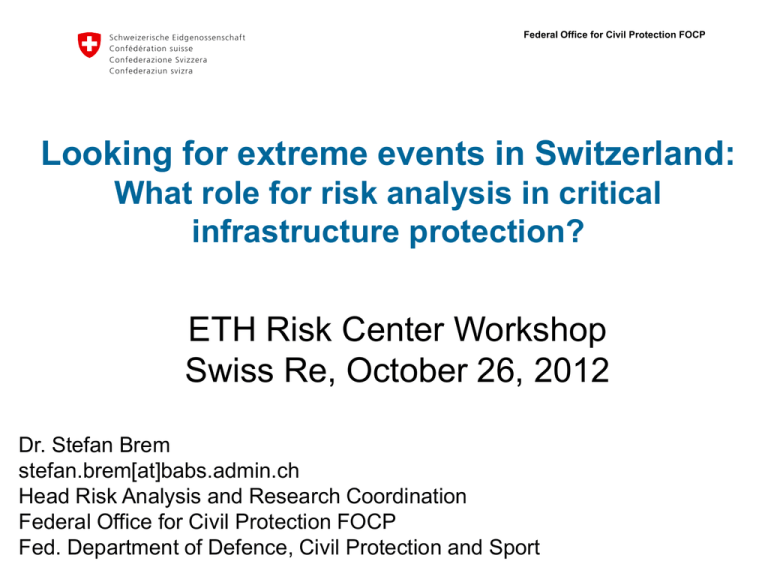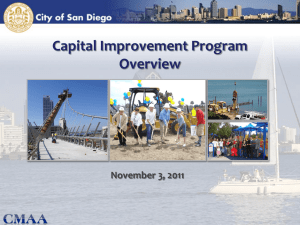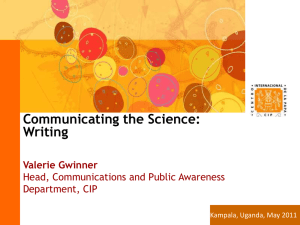
Federal Office for Civil Protection FOCP
Looking for extreme events in Switzerland:
What role for risk analysis in critical
infrastructure protection?
ETH Risk Center Workshop
Swiss Re, October 26, 2012
Dr. Stefan Brem
stefan.brem[at]babs.admin.ch
Head Risk Analysis and Research Coordination
Federal Office for Civil Protection FOCP
Fed. Department of Defence, Civil Protection and Sport
Looking for extreme events in …
Chile, 2010
Basel, 1356
Katarisk, 2003
Federal Office for Civil Protection FOCP
2
Katarisk: Methodology
Risk analysis
➊
Statistics of
incidents
➋
Description of
scenarios
Comparative overview
Check of plausibility
using statistics
➍
Calculation of
statistical damage
values
➌
Plotting of
cumulative
frequency curves
Risk valuation
➎ Monetary terms
of statistical damage values
(marginal costs)
➏ Weighting
by consideration of
aversion against largescale incidents
Federal Office for Civil Protection FOCP
3
Agenda
• Concept of Critical Infrastructure
Protection (CIP) in Switzerland
• Swiss CIP Programme
• National CIP Strategy
• Identification of CI Objects
• Risk Assessment and CIP
• Conclusion and Discussion
Federal Office for Civil Protection FOCP
4
CIP concept in Switzerland
Preventing breakdowns
Public Administration
Industry
Energy
Waste Disposal
RISK
Health
RISK
TECHNICAL
HAZARDS
Financial Services
INTERVENTION
ICT
Water and Food
Public Safety
Transport
Reducing damages
Federal Office for Civil Protection FOCP
5
CIP Programme in Switzerland
Mandate by the Federal Council
• Implementation of the national CIP strategy 2012
Role of the Federal Office for Civil Protection
Chairing the CIP Working Group
Coordination of the activities based
on the national strategy
Aim and purpose of the CIP Programme
•
•
•
•
Development of uniform approach
Creation of joint basic documents
Facilitation of dialogue and collaboration
Protection of the population and its livelihood (Art. 2, CPCD Law)
Federal Office for Civil Protection FOCP
6
National CIP Strategy 2012
Strategic Goal
The national CP strategy aims at improving
the resiliency of critical infrastructures in
Switzerland. It ensures a coordinated and
unified approach of all actors involved.
Basic Principles
•
•
•
•
Comprehensive risk-based approach
Proportionality
Responsibility of the actors
Public-private partnership
Federal Office for Civil Protection FOCP
7
Measures of the National CIP Strategy
• Improve the general framework of the
cross-sectoral collaboration
• Improve the CI’s resiliency
• Key points of the strategy
Identification and compilation of CI objects
(CI-Inventory)
Establishment of cross-sectoral platforms
Improving information exchange (incl. early
warning)
Handling of CI failures (federal support)
• CIP as a permanent process
(inventory, comprehensive protection
concepts, risk dialogue, etc.)
Federal Office for Civil Protection FOCP
8
Inventory of Critical Infrastructure Objects
Failure of a national
critical infrastructure
Failure of a• regional
Aim: Inventory of Swiss Critical Infrastructure objects
critical infrastructure
Contribution to the provision of important goods and
services and / or hazard potential
• Purpose: Basis for planning and prioritisation in risk
and disaster management
Confederation, Cantons, CI operators
• CI Inventory replaces Catalogue to Ensure Basic
Needs (previously operated by the military)
• Extension in terms of CI sectors, operators, threat and
measure spectrum
• Identification of CI objects uses standardised process
• Method elaborated and approved by CIP WG
• Committees of relevant actors on national level
Federal Office for Civil Protection FOCP
9
Prioritisation process
1) Creation of a function structure
In every CI
subsector
2) Determination of relevant object groups
3) Definition of threshold levels
4) Compilation and evaluation of CI objects
a) Output potential
b) Hazard potential
5) Completion with cantonal objects
Swiss approach is similar / compatible with the EU approach
Focus lies on national importance rather
than on cross-border effects
CIP Inventory considers international aspects
Federal Office for Civil Protection FOCP
10
Database CI Inventory and Object Files
Dummy version
Federal Office for Civil Protection FOCP
11
Risk Assessment and CIP
Objectives and purpose
• Multi- (integrated) risk analysis to prioritise hazards
(country risk assessment)
• Integrate know-how to increase risk awareness (e.g.
dependencies/cascades)
• Elaborate foundations for further analyses,
(preparedness) planning, training and information
Federal Office for Civil Protection FOCP
12
Methodology to assess the hazards
• Risk = Impact x Frequency/Probability
• Impact (damage) is described by 13 indicators
• Assessment based on the scenario of the risk files
Assessment
• Expert-Delphi (workshops)
Freq/Probab
Expert
groups
Impact
Federal Office for Civil Protection FOCP
Indicators of the damage
Aggregation
of Impact
Marginal costs
13
Workshops
Proof of concept, December 2011
• Validation of methodology with a sample of risk files
(inter alia earthquake, drought, power blackout, animal disease)
• Participants primarily with methodological expertise (academia,
insurance, federal, cantonal and communal authorities, etc.)
Assessment workshops of the scenarios
• 13 workshops between May and August 2012
• Participants depending on the hazard from federal, cantonal and
communal authorities (intel, police, health, etc.), academia, CI
operators (energy, transportation, IT, finance, etc.), etc.
• Validation by (re)insurance representatives
• In total, some 70 experts involved in assessment
Federal Office for Civil Protection FOCP
14
Risk files and scenario
Systematic structure of the risk files
•
•
•
•
•
•
•
•
•
•
Definition / general info
Similar incidents
Driving factors
Dependencies
Scenario
• Description
• Impacts
Legal foundation and references
Scenario as reference for the
assessment of impact and likelihood.
Scenario in risk file is one of many
possible scenarios
(serious / major / extreme).
Scenario is no prediction / forecast.
Scenarios help to anticipate possible
impacts to get better prepared.
Federal Office for Civil Protection FOCP
Risk files
15
Selected hazards for assessment in 2012
Attack with dirty bomb
Attack with sarin
Accident in a chemical plant
Drought
Mass migration of refugees (Kosovo 1999)
Cyber attack
Power blackout
Animal disease
Road accident with dangerous goods
Storm, inland flooding, earthquake
Pandemic
Additional 6 workshops in the context of the revision of the national
CBRN and natural hazard reference scenarios
Federal Office for Civil Protection FOCP
16
To assess the damage: 13 indicators
Description of consequences is based on the Swiss Federal Constitution:
Area of
damage
Sub-area
Life and
Population Health
Help in emergency
Environment Agricultural area + forest
Wealth
Economy
Economic productivity
Provision of vital goods and
services
Basic rights
Law and order
Society
Indicator
B1 – Casualty
B2 – Person injured or sick
B3 – Person in need of support
U1 – Damaged area
W1 – Damage on property and assets
W2 – Reduction of economic
productivity
G1 – Disruption of provision
G2 – Restrictions on basic rights
G3 – Limitations of law and order
G4 – Reduction of good image
Image of and trust in institutions
G5 – Reduction of trust
Territorial control
G6 – Loss of territorial control
Cultural goods
G7 – Damage or loss of cultural goods
Federal Office for Civil Protection FOCP
17
Estimation of Likelihood / Probability / Frequency
FClass
Likelihood
F8
> 30 %
< 30
> 3*10-2
F7
10 - 30 %
30 - 100
3*10-2 - 10-2
F6
3 - 10 %
100 - 300
10-2 - 3*10-3
F5
1-3%
300 - 1'000
3*10-3 - 10-3
F4
0.3 - 1 %
1'000 - 3'000
10-3 - 3*10-4
F3
0.1 - 0.3 %
3'000 - 10'000
3*10-4 - 10-4
F 2
0.03 - 0.1 %
10‘000 - 30'000
10-4 - 3*10-5
F 1
< 0.03%
> 30'000
< 3*10-5
(in 10 years)
Federal Office for Civil Protection FOCP
≈
1 x in . . .
years
≈
Frequency
(1/year)
18
Selection of first results: Natural hazards
Earthquake
Inland Flooding
Federal Office for Civil Protection FOCP
19
Selection of first results: technical and societal hazards
Power blackout
Pandemic
Federal Office for Civil Protection FOCP
20
Comparative Analysis
Figure: Exemplary Riskmatrix
Federal Office for Civil Protection FOCP
21
Available products (so far in German only...)
Federal Office for Civil Protection FOCP
22
Conclusion and outlook
• Increasing importance of CIP
• The aim is not absolute security,
but optimized security
However, extreme events should be considered
in the preparedness and continuity planning
• Value added of comprehensive approach
• Resources are increasingly scarce
Prioritisation necessary
Consideration of residual risk (extreme events!)
• Cross-sector cooperation and coordination
become more and more important
Cross-country cooperation and coordination as well
Federal Office for Civil Protection FOCP
23
Contact information
Dr. Stefan Brem
Head of Risk Analysis and Research Coordination
Federal Office for Civil Protection
Monbijoustrasse 51A, 3003 Bern
Tel +41 31 322 51 37
Fax +41 31 324 87 89
stefan.brem[at]babs.admin.ch
www.civilprotection.ch
Risks Switzerland: www.risk-ch.ch
KATAPLAN: www.kataplan.ch
CIP: www.infraprotection.ch
Federal Office for Civil Protection FOCP
24









